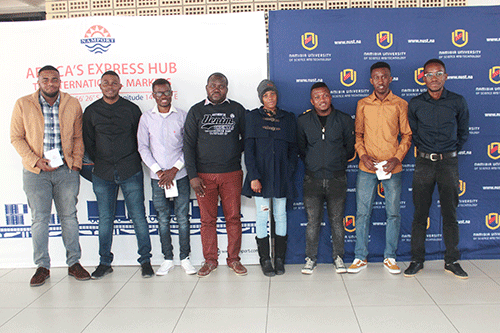Eight Namibian students recently received scholarships from the Namibia Ports Authority (Namport) to complete their engineering courses and get international exposure to the blue economy.
Namport forked out more than N$1 million for this project to see these future marine experts complete their courses in Finland.
One recipient, Anton Kamapunga (24), was ecstatic he was chosen.
“I developed an interest in marine studies but had to opt for mechanical engineering. When marine engineering was eventually introduced, I didn’t hesitate to venture into it,” he told Youth Corner.
Kamapunga added he is happy to be working in the ocean and aims to learn as much as he can and get Namibia on the White List in maritime laws.
“Namibia is not on the White List that allows it to sail internationally or for Namibians to work on international vessels. So, one thing that we would like as our group is for the country to make it onto the List in the marine industry,” he disclosed.
Classmate Alfred Uanekee (23) shared similar sentiments, saying he will never take this opportunity for granted, as it is a rare one.
“I am in love with how machinery operates, and I would love to learn about machines and the maintenance of vessels. As a marine engineer, you are responsible for operation maintenance on the vessels – and that’s why I want to pursue this career,” expanded Uanekee.
The third-year student feels Namibia has the potential to play a role in the marine industry and contribute internationally, but that cannot happen while the country is not on the White List.
“We lack capacity; practical training is key, and we don’t have that. The standard here is not high as in other countries that are whitelisted – like Finland, for example. That’s why we are going to Finland. The standard there is high, and we can learn a lot from them. It strictly complies with IMO regulations, and that’s why it’s on the list,” he expressed.
Uanekee encouraged other Namibians to venture into marine engineering, as there are numerous opportunities to explore.
“They (prospective students) must be good in mathematics, they must have a love for engines – like the internal combustion ones – and overall eagerness to know how engines operate and are maintained,” he noted.
Kristof Timotheus (24) yearned to study something different from what most students do.
“Ever since I came to NUST, I have been doing mechanical engineering, but that’s very broad; I wanted something more specialised. Looking back, in high school, I remember making a solar-powered boat just for illustration purposes but now things are adding up, and this is where I belong,” he recalled.
The double-degree project was founded on the premise of satisfying the wider spectrum of maritime education and training needs in Namibia.
Upon completing their studies, students will obtain a degree, certified by both NUST and Finnish Satakunta University of Applied Sciences.
The double degree increases the employability of graduates because the qualification is supported by two institutions.
The students acquire a broad range of skills, interdisciplinary knowledge and adaptability during their studies.
– psiririka@nepc.com.na



